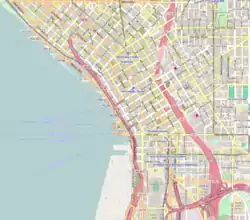| 1600 Seventh | |
|---|---|
_from_Plymouth_Pillars_Park.jpg.webp) | |
 Location within downtown Seattle | |
| Alternative names | 1600 Bell Plaza Pacific Northwest Bell Building US West Communications Qwest Plaza |
| General information | |
| Type | Commercial offices |
| Architectural style | International |
| Location | 1600 7th Avenue Seattle, Washington |
| Coordinates | 47°36′48″N 122°20′04″W / 47.6132°N 122.3344°W |
| Construction started | 1973 |
| Completed | 1976 |
| Height | |
| Roof | 498.01 ft (151.79 m) |
| Technical details | |
| Floor count | 32 |
| Floor area | 766,800 sq ft (71,240 m2) |
| Design and construction | |
| Architect(s) | John Graham & Company |
| Main contractor | Hoffman Construction Co. of Washington |
| References | |
| [1][2][3][4] | |
1600 Seventh is a 32-story, 498 ft (152 m) skyscraper in Seattle, Washington, United States. Designed by John Graham & Company, it was completed in 1976; as of 2022, it is the 22nd-tallest building in the city. Originally built as the headquarters of Pacific Northwest Bell, it was first known as the Pacific Northwest Bell Building during construction and subsequently as 1600 Bell Plaza upon opening; it was later known as Bell Plaza and Qwest Plaza under US West and Qwest ownership.[5][6]
History
Pacific Northwest Bell had used as many as 12 buildings in Seattle to serve the city and its surrounding area since the 1920s.[7][8] Owing to the rapid growth in the region, the company elected to consolidate its headquarters in one location.[7] In the wake of the 1973–1975 recession, the main architects, John Graham & Company, elected to design the building with an emphasis on utilitarianism; it stood in stark contrast to the nearby Seafirst Building, which was built during the previous decade.[7][9]
The Hoffman Construction Company of Portland, Oregon, was selected on December 5, 1973, as the general contractor for the building. Other bidders for the project included Baugh Construction, H. A. Anderson Construction, Howard S. Wright Construction, and Peter Kiewit Sons'.[10]
The building was topped off in July 1975; however, the company elected to forgo a ceremony due to perception concerns in light of a then-recent rate increase proposal that was to add $64 million in revenue.[11]
The building was dedicated on November 22, 1976, in a ceremony featuring then-Governor Dan Evans and various politicians and business leaders as well as Don Ameche, the actor who portrayed Alexander Graham Bell in the 1939 biographical film about him; the total cost of construction was estimated at $40 million. A naming contest for the building resulted in the selection of "1600 Bell Plaza", proposed by company employee Bev Ardueser, from 2,000 entries.[12]
Qwest reduced its presence in the building to half-occupancy in 2008 as part of consolidation plans.[13][14] That same year, the company listed the property for sale; a tentative deal with an unknown buyer fell through amid the Great Recession.[6][14]
In April 2012, a year after acquiring Qwest Communications, CenturyLink sold the building to New York real estate investment firm Clarion Partners for $137 million. Clarion is now leasing lower-level floors to CenturyLink and WeWork. Floors 4-6 and 16–32 are occupied by Nordstrom, and the ground floor holds retail establishments. CenturyLink's NW Regional President, Brian Stading issued a statement saying that the tower was not a fundamental component of their business strategy.[14] Seattle real estate company, The Urban Renaissance Group, represented Clarion in the sale and will operate the building for the new owner.
See also
References
- ↑ "1600 Seventh Avenue". CTBUH Skyscraper Center.
- ↑ "Emporis building ID 119439". Emporis. Archived from the original on March 7, 2016.
- ↑ "1600 Seventh Avenue". SkyscraperPage.
- ↑ 1600 Seventh Avenue at Structurae
- ↑ "Card-carrying snackers need no cash". The Seattle Times. November 17, 1997. p. E1. Retrieved January 30, 2022 – via NewsBank.
- 1 2 Pryne, Eric (July 20, 2008). "Seattle office market could turn in tenants' favor next year". The Seattle Times. Retrieved January 30, 2022.
- 1 2 3 Hayman, Sally (February 20, 1977). "1600 Bell Plaza Reflects Its City, Its Time in History". Seattle Post-Intelligencer. p. F5. Retrieved August 26, 2021 – via NewsBank.
- ↑ Lenggenhager, Werner (March 8, 1970). View up to Stimson Building, Telephone Building and Safeco Tower on 4th Ave., March 8, 1970 (Image). Seattle Public Library.
This is one of multiple Telephone Buildings in Seattle. They served as home to different iterations of the Pacific Northwest Bell Company. A building at 1200 3rd Ave. was constructed in 1921 and another was built in 1922 at 1101 4th Ave. was demolished in 1969 and replaced with a new building in 1970. Another building was constructed at 1122 Third Ave. in 1955, replacing the building seen here. The company later moved to the 1600 7th Ave. Building, which was also known as the Telephone Building and later Qwest Plaza.
- ↑ Lane, Polly (April 25, 1976). "Energy efficiency in Ma Bell's new tower". The Seattle Times. p. H9. Retrieved August 26, 2021 – via NewsBank.
- ↑ "Hoffman gets P.N.W. Bell building job". The Seattle Times. December 5, 1973. p. E16. Retrieved August 26, 2021 – via NewsBank.
- ↑ Collins, Alf (July 27, 1975). "Odd Parcels". The Seattle Times. p. C3. Retrieved August 26, 2021 – via NewsBank.
- ↑ "Ma Bell Rings In a Building". Seattle Post-Intelligencer. November 23, 1976. p. A13. Retrieved August 26, 2021 – via NewsBank.
- ↑ "Qwest Communications to sell Bell Plaza building". Seattle Post-Intelligencer. March 19, 2008. Retrieved January 30, 2022.
- 1 2 3 Pryne, Eric (April 2, 2012). "CenturyLink sells Seattle's Qwest Plaza; Nordstrom inks big lease". The Seattle Times. Retrieved Feb 22, 2016.